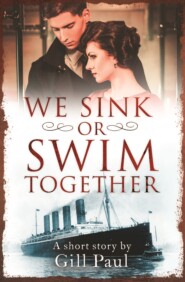По всем вопросам обращайтесь на: info@litportal.ru
(©) 2003-2024.
✖
Women and Children First: Bravery, love and fate: the untold story of the doomed Titanic
Настройки чтения
Размер шрифта
Высота строк
Поля
She favoured Plan B, which was that, in the event her mother failed to entice some rich gent to propose to her during the crossing, they would rent a small house in upstate New York, sit out the remainder of the pregnancy then have the baby adopted through a Christian adoption society. Juliette could return to England and the life she’d known before with no one any the wiser. Even her own father and brother had no idea about her pregnancy; they thought she and her mother were simply visiting some distant American cousins. And as for the baby’s father, he would never find out.
Charles Wood was their local member of parliament, and quite high up in the Liberal party. Juliette had been introduced to him because of her charity work, and one weekend he had invited her to a house party on his estate. It was there, after an invigorating evening of discussion with distinguished guests who even included the prime minister’s daughter, Violet Asquith, that Juliette had allowed Charles to come to her bedroom while the others slept. She had been flattered by his interest in her. Her head was turned. She had heard whispers of other girls who had done ‘it’, but not of any who got caught out. It was her own stupidity to develop a crush on a married man and get carried away without the least thought for the consequences.
There had been no point in telling Charles. What could he have done? In the unlikely event he offered to divorce his wife and marry her, he would have destroyed his parliamentary career. In 1912, no one would countenance a divorced MP. Besides, her mother would never have allowed the marriage. She had much grander plans for her eldest daughter. Juliette must either marry money or she must marry landed gentry, as her younger brother would inherit the Mason-Parker estate. She had been born to a titled family and must uphold the standards set by her own upbringing, which meant no commoner was good enough (unless he happened to be sufficiently loaded to make such criteria insignificant).
Juliette dabbed a little cherry tooth powder onto her brush and scrubbed her teeth, then rinsed and spat. She wouldn’t let herself think about the creature growing inside her belly because she knew it would be the undoing of her. Their Labrador Tess had given birth to five puppies just last Christmas – little blind pink wriggly things – and they had given away four of them as soon as they could. Her baby would be the same. It would go to decent people and have a happy life, and one day in the future when Juliette was married to a man she loved, she would have children of her own.
She crept back into bed and pulled the satin coverlet up to her chin. Why was it always women who had to do the hardest things? How much easier it must be to be a man. Juliette wished with all her heart that she could fast-forward time to seven months from now when they would be on the return voyage to Southampton, footloose and unencumbered.
Chapter Three
Annie McGeown sat on the edge of a bunk and watched her four children breathing. They were so peaceful now, like little angels. Shame it hadn’t been that way earlier. They’d only been on the ship for twelve hours since boarding at Queenstown, but the eldest boys were running riot, feeling cooped up in the limited space. Back home she could kick them out into the fields between meals, but here there was just the third-class outdoor deck and the long corridors where they bashed into other passengers and got told off for making a racket. Her oldest, Finbarr, had already kicked his ball over the railings into the Atlantic and they had nothing left to occupy them except a set of quoits provided by a friendly deck steward.
Oh, but they were lucky, though. Look at this place! They had a cabin of their own with six bunk beds, two of which were empty since the baby shared with her. There were real spring mattresses and clean pillows and blankets. There was a tiny porthole and even a washbasin crammed in between the beds. And the food! It was the best she’d eaten in her life, no question. She’d felt so grand, sitting with her brood in the restaurant, each in their own places and a highchair for the baby, and waiters serving them with three courses at dinner. A lovely soup and bread, roast meat and potatoes and then a plum pudding for afters. She was stuffed to the gills. And the menu for the next day had been pinned on a notice board, promising ham and eggs for breakfast. Any more than a week of eating like that and she’d be the size of a house when she got to America and met up with Seamus again.
It was a year and a half since she’d seen her husband, and even that was only for a month when he’d managed to wangle a cheap passage and come back to Cork for a visit. He’d never met his youngest, didn’t know any of the children well, because he’d been out in New York for five years, working on the railways and saving enough money to afford a good home there. And now at last he was ready for them to be reunited. He’d written that he had leased a three-room apartment in a place called Kingsbridge, a suburb of New York City where there were lots of other Irish. There was a Roman Catholic church and good Catholic schools, and the people were friendly and welcoming. The local priest was helping him to find some furniture so it would be all homely when they arrived. In that last letter, he’d sent the money for their tickets: thirty-five pounds and five shillings, a vast sum. But in America, Seamus earned two pounds a week, which was unthinkable back home in Ireland. Annie didn’t even know anyone who got two pounds a month!
It was a new life for all of them. Their children would better themselves and get good jobs one day. The only bitter-sweet edge was the sadness Annie felt for the relatives she’d left behind: her elderly mam, her brothers and sisters and cousins. Would she ever see them again? Or would they just write letters once a month with mundane news about marriages and jobs and mutual friends and never be able to put into words how they really felt? Her mother couldn’t write, but one of her sisters had said she’d take dictation.
Look on the bright side, Annie, she urged herself. Here you are on the most luxurious ship in the world having a rare old time of it, and in five days you’ll be with yer man again. She felt excited at the thought. Married thirteen years and she still felt as much passion for him as the day they were wed. She hugged herself, thinking of the moment they’d walk down the gangplank with all their bags and there he’d be, grinning from ear to ear with his arms stretched wide.
The people in third class were friendly as well. Earlier that evening, after dinner, there had been a quick knock on the door of her cabin. She’d opened it to find three women about her age grouped outside.
‘I’m Eileen Dooley,’ one said. ‘This is Kathleen and Mary. We noticed you earlier with your brood. Aw, will you look at them all peaceful now, God bless them.’ The other women poked their heads round the cabin door for a peek. ‘Anyway, we’re going for a cup of tea and a chat while our menfolk are in the smoking room and we thought you might want to come along for a bit of adult company.’
Annie had been planning to spend the evening embroidering a blouse for her daughter while she had a bit of peace with them all asleep, but she was tempted. ‘That’s neighbourly of you, but I’m worried about leaving the little ones in a strange place. What if they wake up?’
‘Your eldest looks old enough to cope. What age is he?’
‘Ten.’
‘Sure and they’ll be fine. Turn the key in the door so they can’t run off and get up to shenanigans.’
Still Annie hesitated. ‘Am I dressed all right? Some folks looked so smart at dinner time. Maybe I should wear a hat?’ The woman called Kathleen had a hat on but the others didn’t.
‘You’re fine, love. Keep your hat for Sunday best.’
‘If you’re positive,’ she said, picking up her bag and searching through it till she found the cabin key. ‘They’re all out for the count here, so I’ll just come for a quick brew.’
They’d led her to the third-class general room, where there were polished tables and chairs, teak wall panels and white ceramic fittings. Kathleen turned out to be an old hand at transatlantic travel, and she kept exclaiming how much better the Titanic was than any other ship she’d been on.
‘Some of these ships just pack you in like cargo,’ she said. ‘And you have to take your own food along, so by the end of a week’s voyage everything is stale and the bread’s mouldy. This place is a palace compared to them.’
‘Aren’t you the brave wan travelling on your own with the children like that?’ Eileen told Annie. ‘We’re a big group. Fourteen of us, all from Mayo, so we’re company for each other. You’ll have to sit with us for your meals or those childrun will drive you to the demon drink by the time we reach America.’
‘I’d love to,’ Annie said. She’d been feeling a bit shy on the ship, not sure about the correct etiquette. Was there a dress code? Could she ask the stewards to heat a bottle for the baby? He liked his milk warm. Which bits of the ship were they allowed to wander in and which were off limits? Now there were some people she could ask, who had crossed on these ships before and could tell her what to do. They seemed a lovely bunch.
When she got back to her cabin, the children were still sound asleep, without a clue that she’d been gone a while. She climbed into bed, shifting the baby over beside the wall so he couldn’t fall out. Strange to think that on the other side of that wall were thousands and thousands of miles of ocean, all the way from the Arctic to the Antarctic, and up above them only stars. She said her prayers in her head, before dropping off to sleep.
Chapter Four
Reg lay awake mulling over what he’d seen on the boat deck. Of course, he knew that rich men had affairs. He’d sometimes see them sneaking shoeless out of the wrong cabins when he passed in the early morning on his way to the dining saloon. From the girls’ point of view, he could understand if they were short of money and a wealthy older man bought them jewels and fashionable gowns; that probably happened the world over. He knew from gossiping with the other lads in the mess that Mr Guggenheim had his mistress on board with him, a young French singer called Madame Aubart. They’d taken separate suites, but everyone understood that hers wasn’t occupied because she stayed with him. His wife was back home in New York. Perhaps she knew about the mistress and turned a blind eye? These things happened.
Was that the case with Mr Grayling and the girl? He had a large fortune made in South American mining. Did he buy her expensive gifts in return for her favours? Somehow it didn’t fit with the scene Reg had witnessed. The girl had an air about her as if she had grown up with wealth. Why would she need Mr Grayling’s money if her family had plenty of its own? She could obviously afford to dispense with a fur coat that had cost goodness knows how much … Reg couldn’t imagine what it might be worth but he knew it would be more than he earned in a year.
If it weren’t about money, why would a stunning girl like her be having an affair with a man who must be more than twice her age? Reg guessed she wasn’t any older than himself, and he was twenty-one. It certainly couldn’t have been physical attraction because Mr Grayling wasn’t a looker. He was a round-faced gent with sleek greying hair and a waxed moustache, who gave the impression of a sea-lion when first you met him. His figure was sea-lionish as well. It disturbed Reg to visualise his ample belly pressed against the girl’s slender frame. If truth be told, it made him feel a bit sick.
It wasn’t just the physical side that disturbed him, but also his loyalty to Mrs Grayling. She had been friendly to Reg from the first day of her Mediterranean cruise the previous year, complimenting him on his proficiency at silver service, praising the food, the views and the décor of the dining saloon. One afternoon she had eaten lunch alone because her friend felt poorly, and afterwards, while Reg was clearing the plates, they got into conversation.
‘Where’s home for you, Reg?’ she asked.
‘Southampton, ma’am.’
‘Do you live with your family? Or your wife?’
‘I live with my mum and three younger brothers. I’ve got a girlfriend, Florence, but we’re not married.’ He wasn’t usually one for opening up to anyone about his personal affairs but Mrs Grayling was so amiable he found himself confiding in her.
‘Do tell me how you met Florence,’ she urged. ‘I love hearing about the beginnings of relationships.’
Reg paused in his work and leant on the back of a chair. ‘It was just over a year ago,’ he told her. ‘I was down at the docks one afternoon because there was a German ship moored – the Prinz Friedrich Wilhelm – and I’d never seen her before. Florence happened to be there with her friend Lizzie and we got talking about the ships.’
In his head he relived the scene. He had overheard the girls wondering where the Prinz Wilhelm came from so he called over to tell them. ‘She sails out of Bremen, and comes here first, then to Cherbourg and on to New York.’
‘Is it a passenger or a cargo ship?’ Florence asked, moving closer, and Reg explained that the transatlantic routes made most of their money ferrying emigrants to the States, but that they also took mailbags and a few tons of cargo. He told them he worked for White Star Line on their transatlantic steamers and was just back from a voyage on the Olympic.
‘Is that a fast one?’ Florence asked. The friend, Lizzie, was prettier but she seemed much shyer. All the questions were coming from Florence, so he found himself focusing his answers on her. They were easy questions, ones he could respond to knowledgeably.
‘Did you ask her for a date?’ Mrs Grayling asked, interrupting his reverie.
‘I invited them both for a cup of tea in the Seaview Café, then as soon as the words were out of my mouth I remembered I wouldn’t have enough money to pay if they both wanted cake.’ He grinned. ‘Fortunately, they just asked for tea.’
‘What did you like about her?’
Reg considered. ‘She was easy to talk to,’ he said. ‘She works in a stately home and we compared notes about how some upper-class folk can be a bit unreasonable. Not you, of course,’ he added quickly. ‘I told her about a lady I served on the Olympic who made a big fuss because we didn’t have strawberries in December, as if we should have altered the course of the sun to change their growing season just for her.’ Mrs Grayling laughed. ‘And then Florence told me she got so shy sometimes when serving drinks at the big parties where she worked that her hands would shake, and the posh folks would glower at her as if she had the plague. And I looked at her and felt I understood her somehow. Do you know what I mean? I thought we might be the same.’
He remembered that was the moment when he noticed Florence had a few tiny freckles on the bridge of her nose, and thought he might like to have a chance to count them. She saw him looking and smiled back and it was a nice feeling. She was well turned out, in a blue coat with loads of tiny buttons up the front, and she wore a little hat that had a fabric flower pinned on the hatband. She held her teacup nicely, like a lady, even though her accent was similar to his own. He liked everything about her.
‘So what happened next?’ Mrs Grayling was lapping up the story, completely absorbed. All the other stewards had left the saloon and they were on their own in the vast room.
‘I asked if we could meet again on her next day off, and said I’d bring my friend John. You know – the Geordie lad I work with?’
‘I know exactly who you mean – the steward with the red hair. I’ve seen you chatting to him.’
‘Yes, that’s him. Lizzie didn’t really hit it off with John, though. I don’t think he was enough of a looker for her.’
They’d paired off into couples and walked up to the public gardens, and Reg felt nervous at first. He wasn’t experienced at making conversation with girls and couldn’t think what to talk about apart from ships, but Florence made it easy. She chattered away, full of stories about her huge, chaotic family with umpteen siblings and cousins, and about all the staff politics at the stately home where she worked, then she asked a few questions about him. When Reg told her his dad had left home when he was eight, she squeezed his arm in sympathy, and he thought that was nice. Not too much of a reaction and not too little; just right.
Before she stepped onto the tram that evening, Reg took her hand and raised it to his lips, and she giggled, obviously pleased. She kept waving at him for as long as the tram was still in sight.









